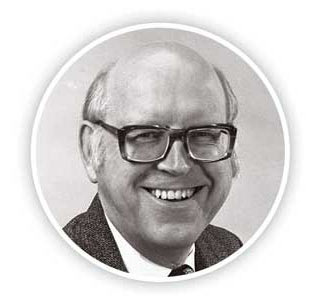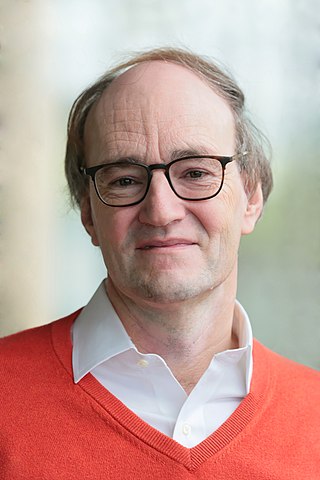Related Research Articles

Allen Newell was an American researcher in computer science and cognitive psychology at the RAND Corporation and at Carnegie Mellon University's School of Computer Science, Tepper School of Business, and Department of Psychology. He contributed to the Information Processing Language (1956) and two of the earliest AI programs, the Logic Theorist (1956) and the General Problem Solver (1957). He was awarded the ACM's A.M. Turing Award along with Herbert A. Simon in 1975 for their contributions to artificial intelligence and the psychology of human cognition.

Judea Pearl is an Israeli-American computer scientist and philosopher, best known for championing the probabilistic approach to artificial intelligence and the development of Bayesian networks. He is also credited for developing a theory of causal and counterfactual inference based on structural models. In 2011, the Association for Computing Machinery (ACM) awarded Pearl with the Turing Award, the highest distinction in computer science, "for fundamental contributions to artificial intelligence through the development of a calculus for probabilistic and causal reasoning". He is the author of several books, including the technical Causality: Models, Reasoning and Inference, and The Book of Why, a book on causality aimed at the general public.
Belief revision is the process of changing beliefs to take into account a new piece of information. The logical formalization of belief revision is researched in philosophy, in databases, and in artificial intelligence for the design of rational agents.
Bart Selman is a Dutch-American professor of computer science at Cornell University. He is also co-founder and principal investigator of the Center for Human-Compatible Artificial Intelligence (CHAI) at the University of California, Berkeley, led by Stuart J. Russell, and co-chair of the Computing Community Consortium's 20-year roadmap for AI research.
Raymond Reiter was a Canadian computer scientist and logician. He was one of the founders of the field of non-monotonic reasoning with his work on default logic, model-based diagnosis, closed-world reasoning, and truth maintenance systems. He also contributed to the situation calculus.
The biennial European Conference on Artificial Intelligence (ECAI) is the leading conference in the field of Artificial Intelligence in Europe, and is commonly listed together with IJCAI and AAAI as one of the three major general AI conferences worldwide. The conference series has been held without interruption since 1974, originally under the name AISB.

Alan Richard Bundy is a professor at the School of Informatics at the University of Edinburgh, known for his contributions to automated reasoning, especially to proof planning, the use of meta-level reasoning to guide proof search.
Hector Joseph Levesque is a Canadian academic and researcher in artificial intelligence. His research concerns incorporating commonsense reasoning in intelligent systems and he initiated the Winograd Schemas Challenge.

Manuela Maria Veloso is the Head of J.P. Morgan AI Research & Herbert A. Simon University Professor Emeritus in the School of Computer Science at Carnegie Mellon University, where she was previously Head of the Machine Learning Department. She served as president of Association for the Advancement of Artificial Intelligence (AAAI) until 2014, and the co-founder and a Past President of the RoboCup Federation. She is a fellow of AAAI, Institute of Electrical and Electronics Engineers (IEEE), American Association for the Advancement of Science (AAAS), and Association for Computing Machinery (ACM). She is an international expert in artificial intelligence and robotics.
Maurizio Lenzerini is an Italian professor of computer science and engineering at the Sapienza University of Rome, where he specializes in database theory, Ontology language, Knowledge Representation and Reasoning as well as service modeling. He is the author of over 400 peer-reviewed articles, a fellow of both the European Coordinating Committee for Artificial Intelligence and ACM, and a member of the Academia Europaea - The Academy of Europe.
Henry A. Kautz is a computer scientist, Founding Director of Institute for Data Science and Professor at University of Rochester. He is interested in knowledge representation, artificial intelligence, data science and pervasive computing.
Christoph Walther is a German computer scientist, known for his contributions to automated theorem proving. He is Professor emeritus at Darmstadt University of Technology.

Francesca Rossi is an Italian computer scientist, currently working at the IBM Thomas J. Watson Research Center as an IBM Fellow and the IBM AI Ethics Global Leader.

Boi Volkert Faltings is a Swiss professor of artificial intelligence at École Polytechnique Fédérale de Lausanne.
Sheila McIlraith is a Canadian computer scientist specializing in Artificial Intelligence (AI). She is a Professor in the Department of Computer Science, University of Toronto. She is a Canada CIFAR AI Chair, a faculty member of the Vector Institute, and Associate Director and Research Lead of the Schwartz Reisman Institute for Technology and Society.
Michael Genesereth is an American logician and computer scientist, who is most known for his work on computational logic and applications of that work in enterprise management, computational law, and general game playing. Genesereth is professor in the Computer Science Department at Stanford University and a professor by courtesy in the Stanford Law School. His 1987 textbook on Logical Foundations of Artificial Intelligence remains one of the key references on symbolic artificial intelligence. He is the author of the influential Game Description Language (GDL) and Knowledge Interchange Format (KIF), the latter of which led to the ISO Common Logic standard.
In database theory and knowledge representation, the one of the certain answers is the set of answers to a given query consisting of the intersection of all the complete databases that are consistent with a given knowledge base. The notion of certain answer, investigated in database theory since the 1970s, is indeed defined in the context of open world assumption, where the given knowledge base is assumed to be incomplete.
Johan de Kleer is a computer scientist working as a Research Fellow at Xerox PARC.
References
- 1 2 "Elected AAAI Fellows". AAAI.
- 1 2 "Giuseppe De Giacomo". awards.acm.org.
- 1 2 "Awards". www.eurai.org.
- ↑ "Giuseppe De Giacomo". Department of Computer Science.
- ↑ "Giuseppe De Giacomo | Dipartimento di Ingegneria informatica, automatica e gestionale". www.diag.uniroma1.it.
- ↑ "Giuseppe De Giacomo's personal website - Papers".
- ↑ "PhD students | Maurizio Lenzerini's home page". www.diag.uniroma1.it.
- ↑ "Cognitive Robotics » People".
- ↑ "De Giacomo | Sapienza - Università di Roma". www.cis.uniroma1.it.
- ↑ Giuseppe De Giacomo author profile page at the ACM Digital Library
- ↑ Giuseppe De Giacomo publications indexed by Google Scholar
- ↑ "Giuseppe De Giacomo's DBLP page".
- ↑ Calvanese, Diego; De Giacomo, Giuseppe; Lembo, Domenico; Lenzerini, Maurizio; Rosati, Riccardo (2007), "Tractable Reasoning and Efficient Query Answering in Description Logics: The DL-Lite Family" , Journal of Automated Reasoning, 39 (3), Springer: 385–429, doi:10.1007/s10817-007-9078-x, S2CID 830547
- ↑ "IJCAI-21 Program Committee – IJCAI 2021".
- ↑ "Chairs – Digital Ecai 2020".
- ↑ "KR 2014 - 14th International Conference on Principles of Knowledge Representation and Reasoning". www.dbai.tuwien.ac.at.
- ↑ "White-Box Self-Programming Mechanisms | WhiteMech Project | Fact Sheet | H2020". CORDIS | European Commission.
- ↑ "WhiteMech - Home". whitemech.github.io.
- ↑ "AAAI Classic Paper Award". AAAI.
- ↑ "ICSOC 10th Anniversary, most influential paper published from 2003 to 2012 at th 11th International Conference on Service Oriented Computing ICSOC 2013 for the paper "Automatic Composition of E-services That Export Their Behavior" published at ICSOC 2003". iris.uniroma1.it.
- ↑ Massimo Mecella (2013-12-05). ICSOC 2013 Award ceremony for the most influential paper 2003 - 2012 . Retrieved 2024-07-17– via YouTube.
- ↑ "Home - OBDA Systems". obdm.obdasystems.com.